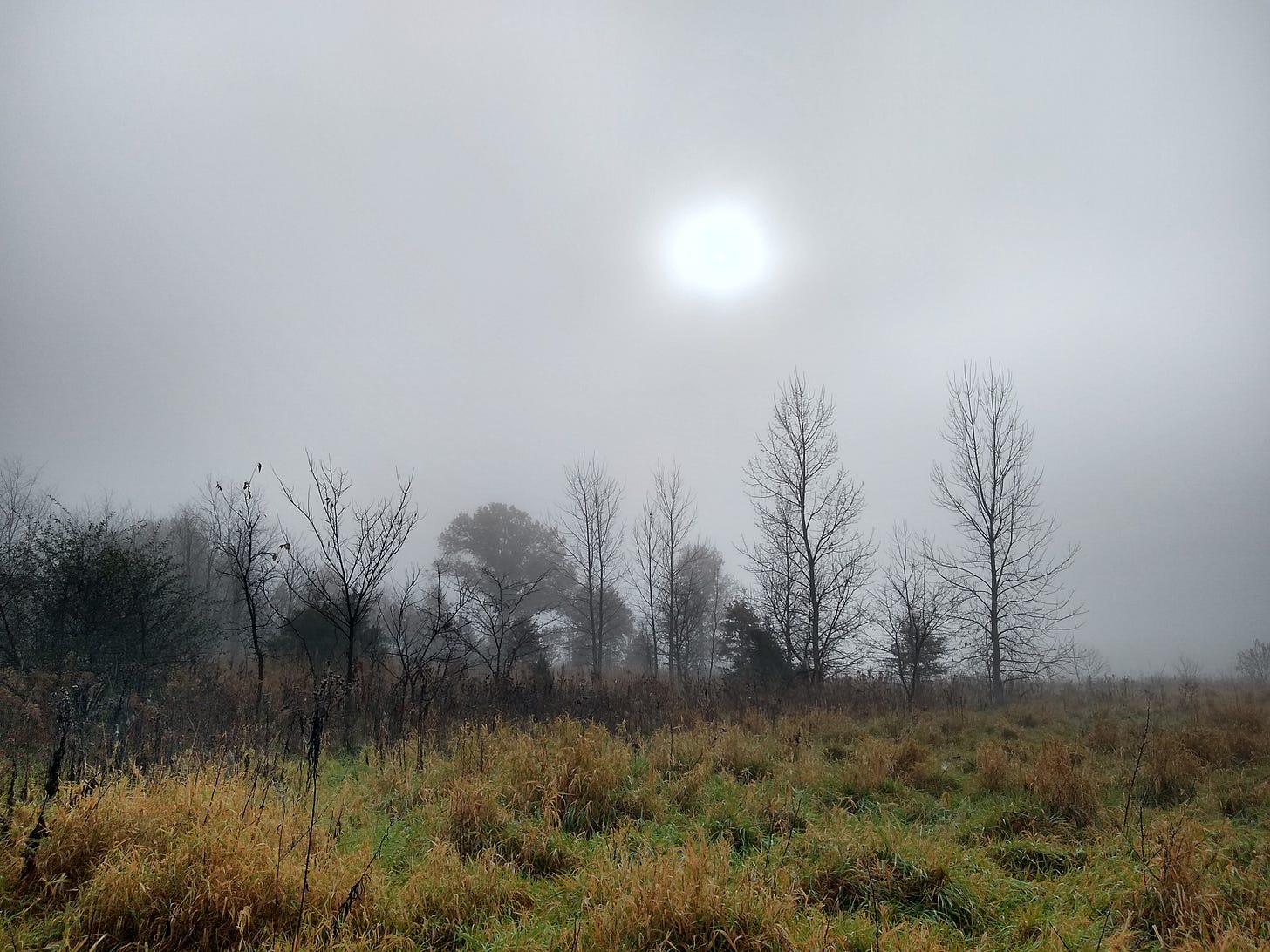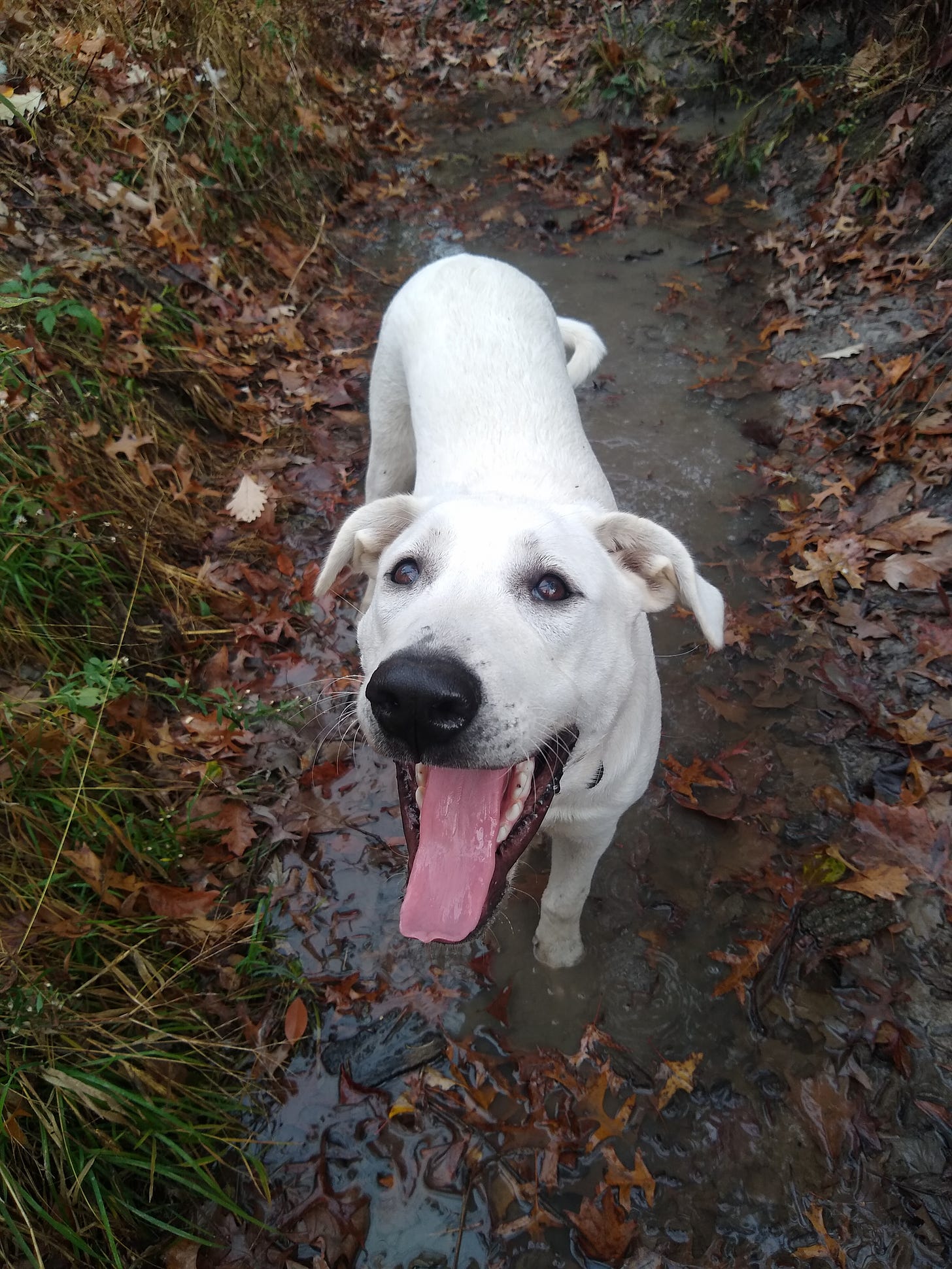Evasion, Leverage, and Magic Beans
There's work to do
This morning was generally the same as all my mornings, give or take the slight variations in weather, wildlife, and my piddling little scribbled objectives– move the pigs, muck the manure out of the turkey wagon, tidy the outhouse, haul water, check sales spreadsheets and confirm deliveries, and fix dinner. This spent and tired prairie slope wears a veil of fog which refuses to burn off, and from the frost-melt of cedar boughs, flocks of white-crowned sparrows sing their bright and brief melodies in the safety of concealment, while red-tailed hawks soar in the distance. The sleeping world of dormant forbs offers a buffet of seed for these cautious foragers– fading tassels of sorghastrum that I instinctively strip and spread while I carry sloppy buckets of whey down to snoring swine in the undergrowth, the cottony fluff of ironweed that I strike about with my herding stick while traipsing down slick pathways, and the graying plumes of goldenrod I tromp down into the soft, prairie mud while stringing up paddock fence, as the crunch and rustle of my invasion into this place sending cottontail rabbits bounding for the safety of brambles.
It is a morning, generally the same as all mornings, and weary as I often am of my repetitive morning tasks, I am relieved to see dawn, even with the sun so obscured behind this unstirring quilt of frozen vapor. The light seems to strike our quiet world with some slight difference. I begin to notice that the draws and creek bottoms of this place can conceal a lot. Even with a long day of piddling little objectives ahead of me, I take some time to play along the bottomlands– stepping as quietly as I can across the sugary scented duff of sycamore leaves and willow twigs, curious as to how near the road frontage I can slink unseen. Looking back to observe any trail I’ve made, the blue jays betray my presence and sharply caw, as a young buck deer breaks for the deep shelter of the woodlands.
Crouching and slightly concealed behind a bare-limbed walnut, I look up the slope at the menagerie of barns and outbuildings visible from the road, and trace with my eyes the strategic, low-lying pathways that lead down to this maze of meandering draws and gullies. It may not seem like much, but I have a fairly intimate knowledge of at least half-a-square mile of land in this township, and a general sense of where all our main tributary creeks lead– where to remain out of sight of highway bridges and broad open fields.
Most of my adult life, and if I’m being honest, a bit of my childhood, has been concerned with evasion. It is only relatively recently that I’ve begun to peek out from these brambles– partly because I’ve felt the economic necessity of broadly marketing the food we raise, partly because I believe there is some hope or value in joining or aiding in the wider project of human community. Like the nervous, snorting buck that stands momentarily in the density of lowland fog, I sometimes tremble in this vulnerable placement, and with the rustle and snap of nearing footsteps, leap back through the wooded haze, flicking my white rump in fear. I am very fortunate, very safe, to have this veil of fog, this concealment of brush. I wonder, if more of us may need such shelter soon.
My personal strategies for evasion probably began as a way to conceal vulnerability, but quickly became a mode of refusal. Refusal to become a debt module, to contribute to the economy of extraction, to feed the machine with my revenue. Still, bedding down in these draws and creek bottoms, stewarding land and only tending to my own has never felt like enough. Living a life of simplicity and voluntary poverty has been a tightrope walk between liberation and peril, and with children to raise, and a world burning on either side of this thin line, it has felt more important to me in the recent past to poke my head out of the brush and do my part, even if it gives someone a clean headshot on me. So while I’m hesitant to offer the exact coordinates, here I am. There’s work to do.
I’ve always felt some affinity with Jack, of Jack and the Beanstalk fame, not that I’ve ever been on any particularly whimsical journey or fantastical adventure before (though I have had to run for my life from people who are bigger than me once or twice). No, it’s the purchasing of magic beans that I relate to– not so much the intended fable about foolish consumerism, but my literal attraction to exciting sources of germplasm. I recently obtained a good-sized orchard’s worth of tree seeds from a somewhat renowned long-time plant breeder– highly edible, low tannin chinkapin oak, hybrid American/European hazelnut, and butternut. Basically, expensive bags of magical nuts that I will stratify in moist earth, protected from rodents in stitched up steel screen envelopes, until they sprout. I will then cultivate some good earth, and sow them into a nursery bed, and after that? Plant them, give them out, sell them if I must… I’m admittedly a bit short on strategy in general, and specifically in relation to the larger predicament we’re all in. I’m tucking my magic beans into their winter homes. I’m planting the seeds that might feed some future person or animal into the safety of soil, as the fires burn and the bombs drop. I do not know if it will work, but it’s the agency I have, and I’d rather exercise it than not. Tending dirt and sowing trees almost feels reflexive, as I wait to hear the next twig snap underfoot.
In the afternoon, one that feels generally the same as most of my afternoons, I work with my pup Wanda, who has developed into something of a large, young dog by now. We check on the cow pasture, check on the trees, and run off some squirrels. Again, I am overtaken by the compulsion to engage in a little hide and seek, pushing through razor-lined rosebush to clop down in a deep cut in the bottomlands, near towering oaks and broad-limbed hedge and the knocked down and rotted out stumps of dead boxelder maple that hold together tomblike enclosures of mud. There are few deer paths down here, and I wonder how many folks could hide here, for how long? If they had to…
We stomp unseen through dry creekbeds, and an old storm-torn maple, dead leaves streaked with mud still stubbornly attached to the stems, lays across our path, flickering with the hopping movements of a couple-few dozen white-crowned sparrows. Perhaps a quarter mile back, we heard the shrill cry of a red-shouldered hawk, that fierce and agile predator of the forest canopy, but down here, concealed in the collision of broken branch and splintered stem, the sparrows hop and forage on detritus almost merrily. I disappear around one muddy bend in the bank, and Wanda disappears around another, and we remain hidden from each other for long minutes, in spite of our geographic nearness, a testament to the concealing qualities of the jagged draws that run through this unassuming quilt-work of broad farm fields and dead-end gravel roads.
It’s not looking great, y’all, particularly for certain communities, but I feel obligated to humbly offer a few considerations. For one, it takes a lot of consensual human labor to operate an authoritarian regime, and honestly, not a lot of people want to work that hard. I don’t know that our bureaucratic institutions are efficient enough to become effective fascists. On the other hand, the past few years have demonstrated that, from disaster response to supply chain operation, the physical infrastructure a fascist regime would need in order to subjugate its population here is extremely vulnerable, and it wouldn’t take so many people from the proper leverage point to gum up the works. I’m just saying. Throughout the world, in the face of all kinds of horror and disaster from colonization, to pandemics, to ethnic cleansing, communities of people have always managed to aid and care for one another, and to some extent, survive. And no authoritarian regime has ever permanently held onto their power, because power creates blindness to vulnerability.
Things are going to get worse, no doubt. And that was already a given. If it’s scary now, we should have been scared before. We are already on track for an unlivable planet. But the more ambitious the regime, the more brittle its armor, and the closer it gets to falling apart. Tend some dirt and plant seeds anyway. And poke your head up now and then, because with the proper level of thoughtfulness, care, and organization, we stand to be at the perfect vantage point for watching the whole thing burn down. As sympathetic as I am to everyone who is now in more danger than before, this election was never going to end genocide or ecocide, and so with harm reduction off the table, we may as well consider harm destruction, that is the complete dismantling of the systems causing the harm.
That’s probably all I should say about that, because I have kids I want to be around for, and I’m mostly just good at producing food with limited resources and playing hide and seek with my dog. But I do have magic beans and some fine hiding places, and I’d like to think that’s more than a good start– it’s a continuation of the work we’ve inherited. What work will you continue?
This evening was generally the same as all my evenings. At dusk we herded the turkeys out of the acorn-floored draws, stopping to watch the white-crowned sparrows flutter up to the safety of cedar boughs from the seed-strewn landscape they were foraging. We walked over to check on the pigs, scratching them behind their coarse, bristly ears as they huddled together ‘neath the cover of marcescent oaks, and picked a mess of greens to go with a comforting dinner cooked with care on the woodstove, warm and safe in our crowded and admittedly untidy dwelling of earth and straw. After dinner and dishes, we fed the dogs and walked out to the cow pasture before brushing our teeth (thankful for the fluoride in our toothpaste), and standing under the sudden veil of nightfall, at the precipice of this old slope we tend, while buck deer emerged from the maze of creek bottoms emboldened by the cover of darkness, we waited in nervous anticipation of what the world would look like when dawn returned.






All well said. I feel like ecological farming is a great form of direct action for regenerating land and people. Sign me up for purchasing some of your seedlings if you find yourself with extra! 🌱